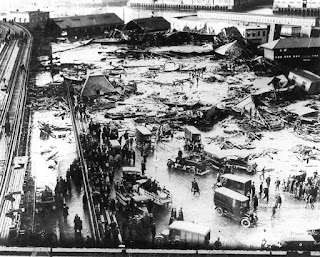McCulloch vs. Maryland: Money Mismanagement
 Most fans of the Hamilton play know that it was Alexander Hamilton that helped establish the National Bank. What most people do not know is that Hamilton's supposed defeat of Jefferson on the issue was not a long lasting victory. In fact, one could say that it was not a victory at all. The debate did not end with the creation of the First National Bank. Many years after the death of Hamilton the debate still lived on.
Most fans of the Hamilton play know that it was Alexander Hamilton that helped establish the National Bank. What most people do not know is that Hamilton's supposed defeat of Jefferson on the issue was not a long lasting victory. In fact, one could say that it was not a victory at all. The debate did not end with the creation of the First National Bank. Many years after the death of Hamilton the debate still lived on.In 1816 the Second National Bank was created to help the federal government in the wake of the War of 1812. The began to call in the loans they had made to states, which of course was met with great displeasure. In Maryland, the state government attempted to retaliate in the form of a tax. The levied a fifteen thousand dollar annual tax on any bank operating in Maryland that was not chartered by the state of Maryland. Of course, there was only one bank fitting that description, the Baltimore branch of the Second National Bank.
 James McCulloch was the head of this Baltimore branch. McCulloch was the one that made the decision to refuse to pay the tax. This, of course, highly upset the State of Maryland and they sued on the grounds that it was unconstitutional for the federal government to establish a bank. Both the Appeals Courts and the Supreme Court of the State of Maryland sided with Maryland. Yet, McCulloch's lawyer, the infamous Daniel Webster, appealed the case to the Supreme Court of the United States.
James McCulloch was the head of this Baltimore branch. McCulloch was the one that made the decision to refuse to pay the tax. This, of course, highly upset the State of Maryland and they sued on the grounds that it was unconstitutional for the federal government to establish a bank. Both the Appeals Courts and the Supreme Court of the State of Maryland sided with Maryland. Yet, McCulloch's lawyer, the infamous Daniel Webster, appealed the case to the Supreme Court of the United States. The United States Supreme Court declared two things. First, it was indeed constitutional for the federal government to establish a National Bank. Secondly, they also decided that the State Legislature could not tax and branch of the National Bank.
The United States Supreme Court declared two things. First, it was indeed constitutional for the federal government to establish a National Bank. Secondly, they also decided that the State Legislature could not tax and branch of the National Bank.The decision was as follows:
Although the Constitution does not specifically give Congress the power to establish a bank, it delegates the ability to tax and spend. Since a bank is a proper and suitable instrument to assist the operations of the government in the collection and disbursement of the revenue, and federal laws have supremacy over state laws, Maryland had no power to interfere with the bank's operation by taxing it. Maryland Court of Appeals reversed.
Article I, Section 8 of the United States Constitution (also known as the Necessary and Proper Clause) gave the federal government the power to establish a National Bank. We may not all like this, yet, a clause is a clause.



Comments
Post a Comment